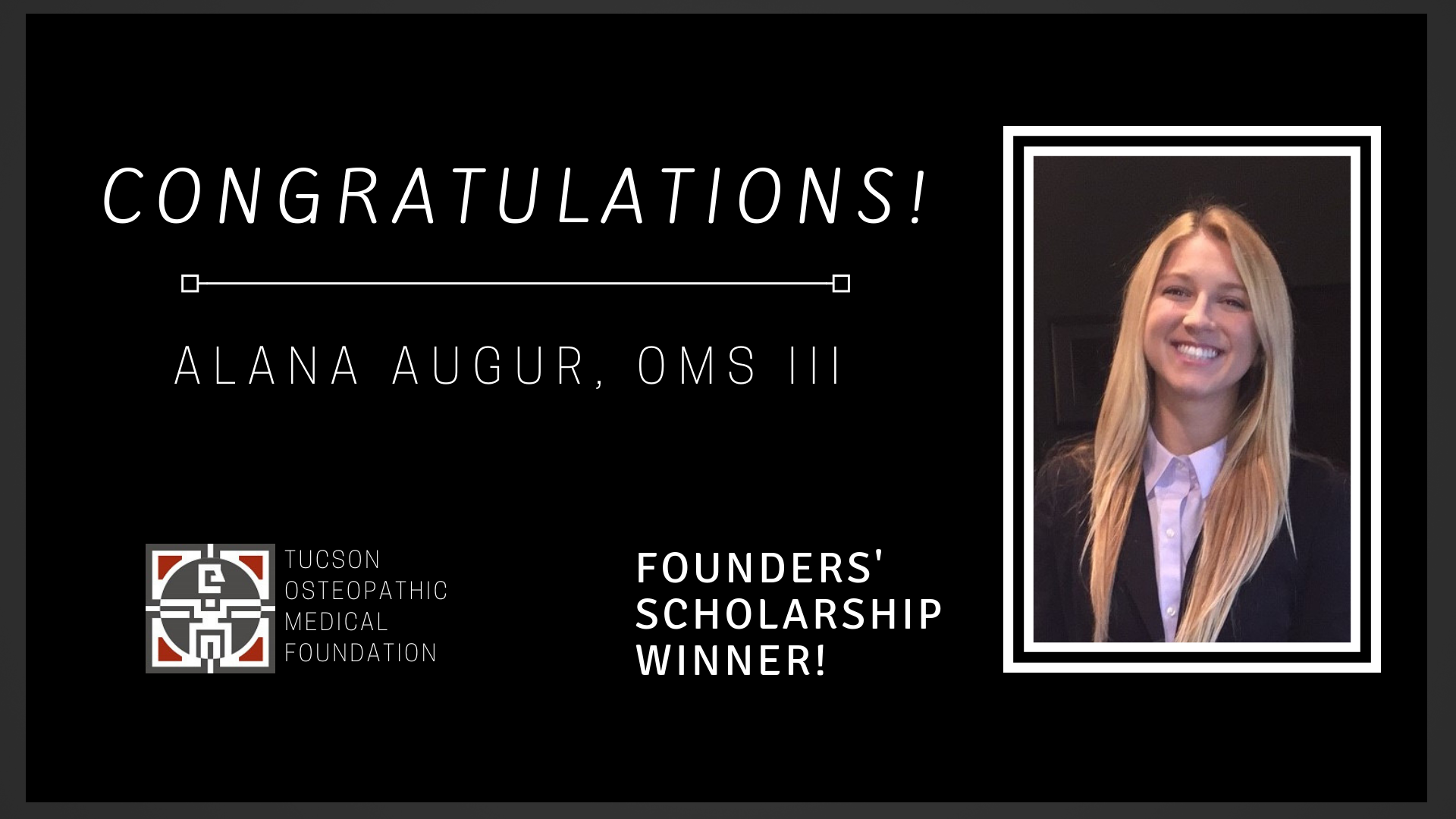Alana Augur, OMS III at Midwestern University - AZCOM, Awarded $5,000 Founders' Scholarship
March 25, 2019

Alana Augur is a third year medical student at Midwestern University in Glendale Arizona. She matriculated directly from her undergraduate studies at the University of Arizona. There, she completed an Honors degree, majoring in Biology and minoring in Mathematics. Alana completed her honors thesis on Diet Specialization and Generalization Tradeoffs in the Mustard Herbivore Scaptomyza Flava. She was involved in multiple research roles at both the University of Arizona Ecology and Evolutionary Biology department, as well as at the University of Arizona Phoenix College of Medicine.
Where do you consider home to be?
I consider home to be all over Arizona. I've lived here for 22 years and I absolutely love this state. Although I've spent most of my time in the greater Phoenix area, Tucson also feels like home after my four years at the University of Arizona.
What do you love about Arizona?
Arizona sunrises and sunsets are my favorite part of the day. I love being in nature to watch them, but when that isn't possible, I'll catch them on my commutes and I have so much gratitude for this beautiful state.
What is your favorite thing to do in your (very limited!) free time?
I love to cook! Lately I've been marinating chickens in a brine and then drying them out over multiple days in the refrigerator before I bake them. This causes the skin to bake very crispy but keeps the inside moist.
How did you discover you wanted a career in medicine?
Somehow, I have always known it. Ever since I was a kid, science has fascinated me and I knew I would pursue a career that could combine science with a way to help people.
Who has been the most influential person in your life throughout your journey as a medical student?
My obstetrics and gynecology preceptor is the most influential person I have encountered. Her spirit about medicine and life is a breath of fresh air. Her optimism and high energy showed me that medicine, and OB/GYN in particular, is an exciting field to work in. I was only considering this field before I met her, now I am convinced I need to pursue it.
Which specialty do you plan to practice?
I've finally decided on obstetrics and gynecology!
Tell us about a typical day in the life of a medical student.
This year I've progressed to clinical rotations. My duties and schedule vary between different rotations, but I generally see patients on my own, present the case to my preceptor, and begin documentation of their visit. Sometimes I round in hospitals and in other rotations I stay mainly in the outpatient setting. After I get home, I usually have dinner before I study for upcoming exams.
What advice would you give to a student considering medicine as a career?
I would tell any student that if you truly love it, it is worth pursuing. These days, I think many people are discouraging young adults from the medical field, but I have felt lucky every single day for the privilege to attend medical school and have never regretted that my decision for a minute.
What is the most interesting thing you've discovered so far in your medical training?
The biology of cancer is the most fascinating subject. The slightest changes on a microscopic, molecular level can have such profound consequences on every organ in the body. The pharmacologic agents that use the properties of the cancer to target therapy against it are even more impressive.
What excites you about becoming a physician?
I'm excited to deliver babies throughout my career, there is nothing more satisfying than watching a mother and father take the first look at their healthy newborn. Apart from this, I am motivated to incorporate new research and new therapies into my practice as science progresses over my lifetime.
What led you to pursue osteopathic medicine as opposed to allopathic medicine?
I like the idea of approaching patients from a holistic perspective. Especially after starting my clinical rotations, I now understand the need for physicians to take a step back sometimes and look at the patient as a whole again. It is easy to focus on one abnormal lab result and run with it, it is much harder to incorporate that lab result into a picture of the patient, their symptoms, their active medications and past medical history and come to a correct conclusion.
What do you think the future of medicine looks like?
It is hard to say, but every day patients are getting closer and closer to a better quality of life. As science and technology develop, I hope that future generations will have improved access to care and reasonably priced pharmaceuticals that are even more effective than what is on the market today.

